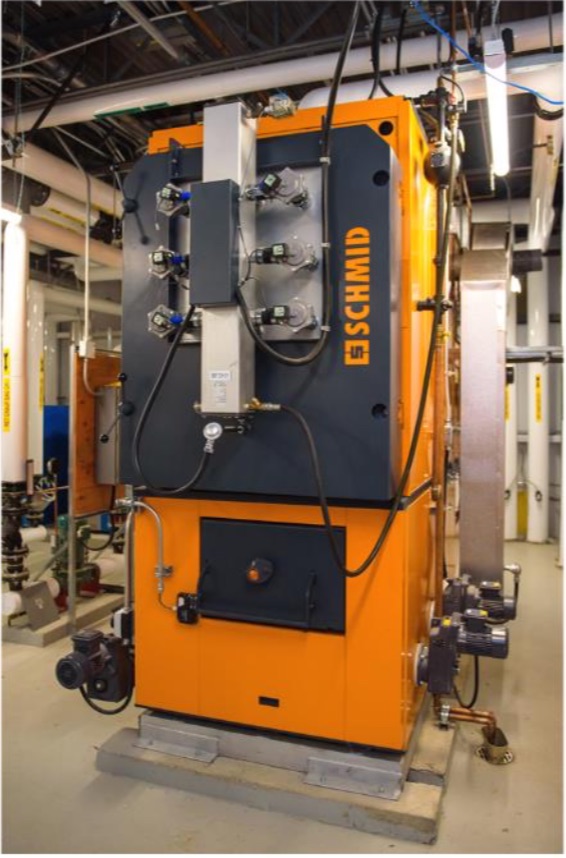
First Schmid biomass boiler installed in Canada
April 12, 2022
By Combustion Expert Énergie
 Photo courtesy Combustion Expert Énergie.
Photo courtesy Combustion Expert Énergie. With a desire to reduce the ecological footprint of the new educational complex of the Centre de formation agricole de Mirabel (CFAM), built in 2020, the Centre de services scolaires des Mille-Îles (CSSMI) has installed an efficient heating system that uses biomass. From the beginning of the design, the CSSMI team’s goal was to integrate technologies and equipment that would optimize heat production in an eco-responsible manner.
With this in mind, and with a desire to meet profitability criteria and environmental targets, the Centre de services scolaire des Mille-Îles, through its call for tenders, involved professionals and experts from a recognized Quebec consulting engineering firm. Experts from Combustion Expert Énergie, a company specializing in the installation and maintenance of biomass boilers, and Enviroair Industries, a company specializing in the heating of institutional buildings, were called upon to demonstrate the effectiveness of the product that met these expectations.
Therefore, as an innovator and forerunner in the field of institutional heating in Quebec, the CSSMI chose a Schmid 360 kW industrial biomass boiler, which exceeded the requirements and performances requested, fuelled with wood pellets; the first to be installed in Canada.
“Concerned about its environmental impact and anxious to reduce its fossil fuel consumption, the CSSMI, for its CFAM site, wished to acquire, for its new complex of buildings with greenhouses, an efficient heating system that would ensure smooth operation and reduce operating and maintenance costs to a minimum.” “On-site cooperation among the various participants in the project made it possible to plan and install this energy-efficient and environmentally friendly solution,” said Guillaume Marchand, coordinator of the CSSMI’s Material Resources Department.
Reducing greenhouse gas emissions
The rising cost of fossil fuels and the environmental concerns surrounding their increased use make biomass energy a recognized and promising solution to ensure the production of renewable energy in an environmentally responsible manner.
“In operation since January 2021, the Schmid UTSP biomass boiler with an underfeed combustion grate has allowed the CSSMI to realize substantial savings compared to fossil fuel, while avoiding significant greenhouse gas (GHG) emissions,” says Marchand.
The Schmid biomass boiler: a green technology available in Quebec
Schmid, a European manufacturer with more than 1,000 installations worldwide, partnered in 2018 with Combustion Expert Énergie and Enviroair Industries to distribute and install its biomass boilers in Canada.
Schmid’s biomass boilers have a capacity of up to eight MW and produce the hot water or steam (low or high pressure) used to heat buildings and in industrial processes. The line of boilers distributed in Canada meets all Canadian industry standards, such as the Canadian Standards Association (CSA) and the American Society of Mechanical Engineers (ASME) manufacturing standards.
The boiler installed at the CFAM is designed to ensure high combustion efficiency while limiting atmospheric emissions. Fuelled by wood pellets, it is perfectly adapted to institutional heating, fully automated and very safe. The energy density and stability of its wood pellet fuel maximize its performance while generating an ash volume of less than one per cent of the wood mass introduced into the boiler, which facilitates ash management, minimizes operating costs and favours local supply.
Automatically controlled by air volume measurements, combustion temperature, combustion chamber pressure, set-point temperature and a host of other variables, Schmid’s industrial grade hot water biomass boiler adapts to heating demand by modulating its capacity from 30 to 100 per cent in minutes while maintaining full efficiency.
This article is part of the Bioheat Week 2023. Read more articles about bioheat in Canada.
Print this page